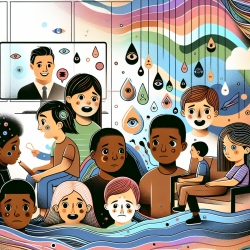Introduction
In the evolving landscape of environmental conservation, the integration of Indigenous and Traditional Peoples' knowledge offers a promising pathway to sustainable ocean management. The research paper "Empowering her guardians to nurture our Ocean’s future" highlights the critical role that Indigenous communities can play in addressing climate change and environmental degradation. This blog explores how practitioners can enhance their skills by embracing Indigenous knowledge systems and encourages further research in this domain.
Understanding Indigenous Knowledge Systems
Indigenous knowledge systems are deeply rooted in a holistic understanding of the environment, emphasizing the interconnectedness of all living things. These systems have evolved over millennia, enabling Indigenous communities to manage marine and coastal resources sustainably. Practitioners can learn from these systems by acknowledging the cultural and spiritual significance of the ocean to Indigenous Peoples and integrating this understanding into conservation strategies.
Challenges and Opportunities
Despite the wealth of knowledge that Indigenous communities possess, their contributions are often marginalized in mainstream environmental management. The research paper outlines barriers such as colonization, language differences, and governance structures that hinder the inclusion of Indigenous knowledge in ocean management. Practitioners can overcome these challenges by fostering collaborative partnerships with Indigenous communities, respecting their sovereignty, and advocating for policy changes that recognize their rights.
Implementing Indigenous Knowledge in Practice
Practitioners can take actionable steps to incorporate Indigenous knowledge into their work:
- Engage with Indigenous Communities: Build meaningful relationships with Indigenous groups, ensuring their voices are heard and respected in decision-making processes.
- Integrate Traditional Practices: Incorporate traditional ecological knowledge into conservation strategies, such as seasonal fishing practices and marine protected areas managed by Indigenous communities.
- Advocate for Policy Change: Support policies that recognize Indigenous rights to land and resources, enabling them to manage their territories according to traditional practices.
- Promote Cultural Awareness: Educate others about the cultural significance of the ocean to Indigenous Peoples, fostering a deeper understanding and appreciation of their knowledge systems.
Encouraging Further Research
The integration of Indigenous knowledge into environmental management is a growing field that requires further exploration. Practitioners are encouraged to conduct research that highlights the successes and challenges of Indigenous-led conservation efforts. By sharing these findings, practitioners can contribute to a broader understanding of how Indigenous knowledge can enhance sustainable ocean management.
Conclusion
Empowering Indigenous communities to take a leading role in nurturing our oceans is essential for achieving a sustainable future. By embracing Indigenous knowledge systems, practitioners can enhance their skills and contribute to more effective and inclusive environmental management. To read the original research paper, please follow this link: Empowering her guardians to nurture our Ocean’s future.










